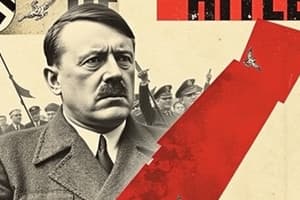Podcast
Questions and Answers
In what year did Hitler become Chancellor of Germany?
In what year did Hitler become Chancellor of Germany?
- 1925
- 1936
- 1930
- 1933 (correct)
What event led to increased support for the Nazi party in 1930?
What event led to increased support for the Nazi party in 1930?
- Publication of 'Mein Kampf'
- End of World War I
- Hitler's arrest
- Economic crisis in Germany (correct)
Which book did Hitler write while in prison after the Munich Beer Hall Putsch?
Which book did Hitler write while in prison after the Munich Beer Hall Putsch?
- 'Das Kapital'
- 'Mein Kampf' (My Struggle) (correct)
- 'War and Peace'
- 'The Communist Manifesto'
What role did 'Mein Kampf' play during World War II?
What role did 'Mein Kampf' play during World War II?
Who recognized Hitler's potential for intelligence work and propaganda?
Who recognized Hitler's potential for intelligence work and propaganda?
What was the main controversy surrounding 'Mein Kampf' in the post-war period?
What was the main controversy surrounding 'Mein Kampf' in the post-war period?
How did the British and French public initially react to the Munich Agreement of 1938?
How did the British and French public initially react to the Munich Agreement of 1938?
Why did propaganda encourage people not to worry about Hitler in the lead-up to World War II?
Why did propaganda encourage people not to worry about Hitler in the lead-up to World War II?
What was the reaction of the elite to the fall of France and the threat of Nazi domination?
What was the reaction of the elite to the fall of France and the threat of Nazi domination?
Why did 'Mein Kampf' become a tool for anti-Nazi propaganda in the United States post-World War II?
Why did 'Mein Kampf' become a tool for anti-Nazi propaganda in the United States post-World War II?
Flashcards are hidden until you start studying
Study Notes
- April 1945: Last days of World War II in Berlin, discovery of Nazi concentration camps, shock and denial among allies.
- 1918: End of World War I, Adolf Hitler, a simple soldier, disillusioned with his post-war life, with no profession, money, or family, clings to the army.
- Capt. Karl Mayr recognizes Hitler's potential for intelligence work and propaganda.
- 1923: Hitler attempts a coup d'etat, the Munich Beer Hall Putsch, fails, and is arrested, but gains notoriety.
- In prison, Hitler writes "Mein Kampf" (My Struggle), a political manifesto, outlining his anti-Semitic beliefs, racial theories, and plans for a Greater Germany.
- 1925: "Mein Kampf" published, despite initial poor sales and criticism, becomes influential in the rise of the Nazi party.
- 1930: Economic crisis in Germany leads to increased support for the Nazi party, sales of "Mein Kampf" surge.
- 1933: Hitler becomes Chancellor of Germany, uses "Mein Kampf" as propaganda tool, recommends it to officials and the public.
- 1936: "Mein Kampf" is a bestseller, Hitler earns significant royalties.
- 1939-1945: During World War II, "Mein Kampf" is distributed to soldiers, used in schools, and becomes a symbol of Nazi ideology.
- Post-War: Controversy over the legacy of "Mein Kampf," with some arguing it should be banned due to its anti-Semitic content, while others see it as a historical document.- In 1938, Czechoslovakia surrenders to Nazi Germany as part of the Munich Agreement, with France and Britain receiving hero's welcome upon their return
- The peaceful intention of the agreement and the naval pact between Britain and Germany are seen as symbols of desire for perpetual peace
- Propaganda advises people not to worry about Hitler and encourages vacations and pacifism as Europe's business elites remain peaceful
- Mind camps, including Colonel Gol's concern about the looming military threat, go unnoticed by the elite
- The peace negotiations of 1939, meticulously planned, are revealed as a failure as Germany invades Poland, occupying much of Europe
- The military might of Nazi Germany is on parade in Paris, with France and Britain seemingly powerless to stop Hitler
- With the fall of France and the threat of Nazi domination, the opinion of the elite about the author's struggle shifts dramatically
- The book, previously seen as insignificant, becomes a tool for anti-Nazi propaganda in the United States
- The book, which had enjoyed great sales prior to 1939, becomes a prized possession for Nazis and is often found in raids and seizures
- Post-war, the symbols of Nazism are eliminated, including the destruction of printing machines and the banning of the book
- The author's work, a bestseller since the 1930s, is now a banned book, inspiring fascination and sales in the Arab world, India, and elsewhere
- In 2016, the copyright on the book expires, making it public domain, but it remains a controversial text, with only critical editions allowed.
Studying That Suits You
Use AI to generate personalized quizzes and flashcards to suit your learning preferences.




